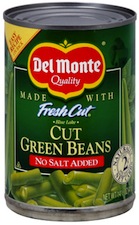 Groups as disparate as Consumer Reports and the National Workgroup for Safe Markets have been studying the amount of bisphenol A (BPA) that could be consumed from eating canned food and drinks.
Groups as disparate as Consumer Reports and the National Workgroup for Safe Markets have been studying the amount of bisphenol A (BPA) that could be consumed from eating canned food and drinks.
A study by The National Work Group for Safe Markets, a coalition of public health and environmental health groups, tested food from 50 cans from 19 US states and one Canadian province for BPA contamination. Over 90% of the cans tested had detectable levels of BPA, some at higher levels than have been detected in previous studies.
One can of DelMonte green beans had the highest levels of BPA ever found in canned food.
Consumer Reports’ tested canned foods, including soups, juice, tuna, and green beans, and found that almost all of the 19 name-brand foods contained some BPA. The canned organic foods tested did not always have lower BPA levels than nonorganic brands of similar foods analyzed, and the chemical was even found in some products in cans that were labeled “BPA-free.”
Exposure of animals to low doses of BPA has been linked to cancer, abnormal behavior, diabetes and heart disease, infertility, developmental and reproductive harm, obesity, and early puberty.
